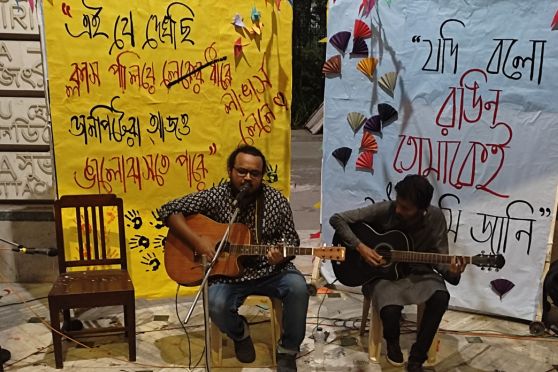Presidency University organised Poruader Prangan; Read full details here


Back in 2021, when the COVID pandemic was on the wane, there was still reluctance on part of the government to reopen educational institutes. Online studies had a significantly negative impact on the quality of pedagogy and research, especially for students from marginalised backgrounds. During those abysmal days, the authority of Presidency University went a step further to add to the disenfranchisement of the students by undertaking an uncalled-for construction at the Prangon — the heart of student activity in the university. To voice their collective resistance against this undemocratic encroachment, ‘Poruader Prangon’ emerged as a space for the students to reclaim their campus life. Using culture as a tool of protest, initiatives by ‘Poruader Prangon’ not only reflected the politics of the time but also became a breath of fresh air to students struggling with their physical and mental health after months of isolation. 'Poruader Prangon' — its name burning with the promise of reclaiming and holding on to students' spaces — persisted as a united voice of the students in a time when the world was, in so many ways, silent.
In post-COVID times too, ‘Poruader Prangon’ successfully organised multiple events. On September 12th, the student platform organised a cultural programme for the freshers of the university at the Portico, where a crowd of both freshers and seniors immersed themselves in the festive atmosphere with glee. With student performances ranging from classical music to band performances, political poetry to grooving to bollywood numbers, the event lived up to its tagline, quoted from Chandrabindoo: “Jodi bolo rongin, tomakei shudhu ami jani” (“If you talk about vibrance, you’re all I know”). What added to the vivacious celebrations of the evening were guest performances by noted musicians like Nilanjan Mishra and Adrija Ghatak (who also happens to be an alumna of Presidency).
What makes ‘Poruader Prangon’ stand apart from any other cultural platform is its history. According to the organisers, the evening was not merely a fun event for freshers but also a continuation of the legacy of cultural resistance in the university and a reminder of the power of togetherness in challenging any authority that turns oppressive.